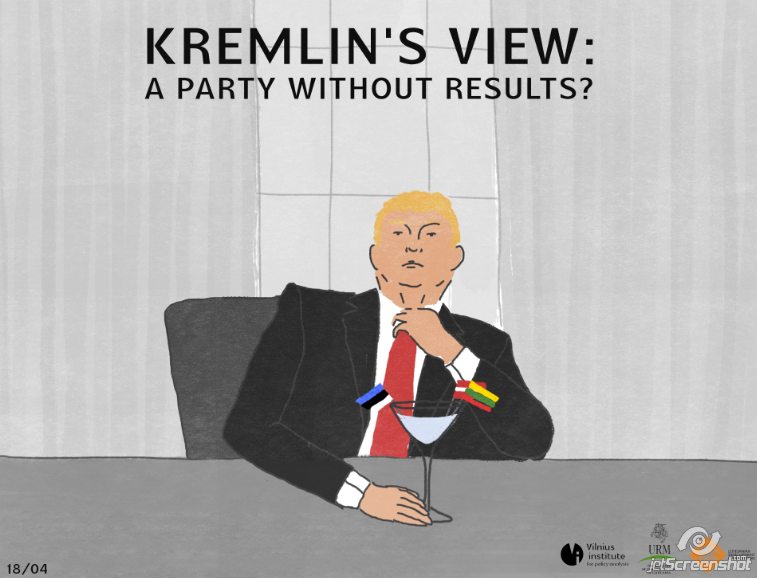
The Baltic presidents’ visit to the US has received special attention from the Kremlin-supported media in order to show that nothing serious has happened. Propaganda outlets tried to convey a message that not only Donald Trump has not promised anything to “the Pribalts”, but also that he has humiliated them. Some local Lithuanian periodicals put effort not to stay behind Kremlin’s disinformation channels. Their goal was not only to show that the visit was insignificant, but also to suggest that nobody cares about the Baltic States, that „we are left on our own“. Let‘s look at two examples of how the meeting at the White House was portrayed in Respublika’s commentary.
The narrative is constructed in these ways:
- We were invited to meet Trump only because the Baltic countries are celebrating the centennial of independence. See, if the centennial was taking place last year, we would have been invited last year, if next, then next year. Apparently, it shows that Washington does not care at all about the cybernetic safety or the air defence shield of the Baltic countries, as it was only discussed occasionally. Here you will not find the relevant facts about the memoranda that was signed between Lithuanian energy companies “Klaipedos nafta” and “Lietuvos duju tiekimas” and the US enterprise “Freeport LNG” concerning the collaboration of supplying liquefied gas which Lithuania buys from the US through Klaipeda terminal in order to diversify the supply and, as a result, strengthen its energy independence. These facts do not fit in the Kremlin’s propaganda narrative which seeks not to inform but to incite emotions and form negative attitudes.
- Lithuanian president is being humiliated for toadying to Trump by employing obscenities: calling the Oval Office “Oral”, claiming that the president licked the US leader’s ass. In this case it is opted for street slang instead of arguments in order to make an impression by insulting and enjoying the power of humiliating another. Emotional language with sexual connotations is favoured instead of the factual argumentation. Even if the facts are referred to, only those that fit the a priori constructed narrative are chosen. The analysis makes way for publicizing a narrative which was conceived beforehand and which will not be modified in any case. Yale historian Timothy Snyder in his latest book “The Road to Unfreedom” has brilliantly drawn our attention to how the Kremlin and its henchmen seek to sexualise political vocabulary: the representatives of the opposition are called perverts, homosexuals, female politicians are downgraded to sex objects etc. In Dalia Grybauskaite’s case, we can see the extension of this strategy.
- It is portrayed that neither the US, nor other influential European Union member states, such as Germany or France, care about us. Apparently, Trump said that they will not risk the relationship with Russia because of the Baltic countries, and Germany which allocates only a little more than 1 per cent of their GDP to defence is only looking after its own interests and funding Russia through the gas pipes that are being built at the bottom of the Baltic Sea. In this way it is attempted to create an illusion that we are left on our own by the most powerful, and that our own spending for defence which are being increased will actually work counter-productively in regard to the relationship with Russia, whose reaction is still unclear. Once again, the attention is not paid to the real world One can simply mention the German soldiers in Lithuania who came here with the NATO defense and deterrence posture “Enhanced Forward Presence whose aim is to ensure Poland, Latvia, Estonia, and Lithuania that the Alliance‘s North-Eastern flank countries are not and will not be left on their own in the face of growing Russian aggression.
The main point of pro-Kremlin’s propaganda is not to encourage us to believe in Russia. The main goal is completely different: to encourage us to mistrust our allies and to renounce our strategic obligations. In this way Kremlin seeks to destroy the transatlantic bonds and to disunite the EU.
__
This text is part of the project aimed at strengthening democracy and civil society as well as fostering closer ties with the EU Eastern Partnership countries (Ukraine, Moldova, Georgia) by spreading independent information with the help of contemporary solutions. The project is implemented by Vilnius Institute for Policy Analysis, and is financed as part of Lithuanian Ministry of Foreign Affairs‘ Development Cooperation and Democracy Promotion Programme.




